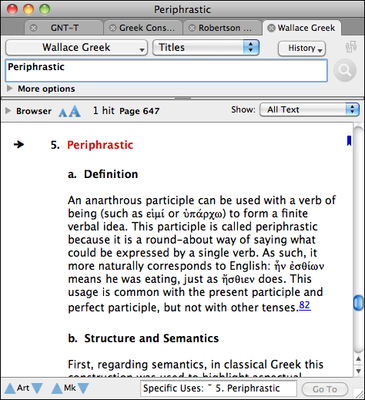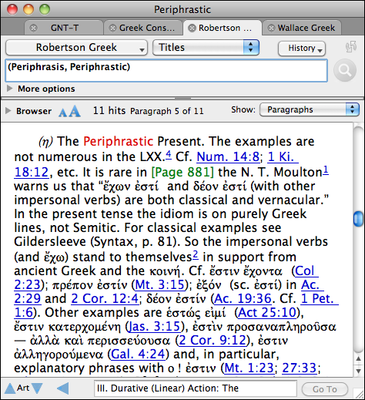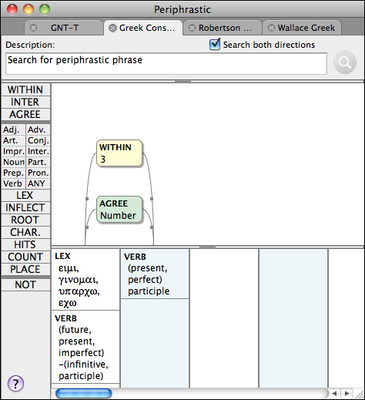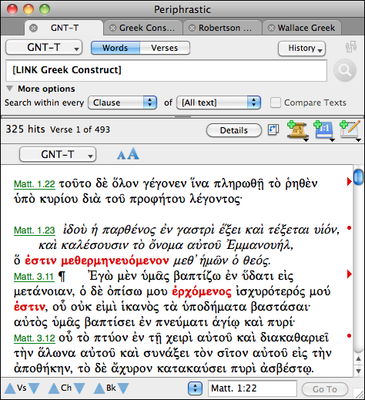The question about periphrastic phrases is an interesting one. I remembered the grammatical construction from my own Greek classes, but thought I’d brush up before trying to construct a search string to find them in the GNT. I was pleased to find all the resources I needed right at my fingertips in various Accordance modules.
I went first to Daniel Wallace, Greek Grammar Beyond the Basics: An Exegetical Syntax of the New Testament (Zondervan: 1996; OakTree Software electronic version 2.5). There I found a very helpful discussion of the various types of periphrastic phrases at II.5 (p. 647).
He regularly cites James L. Boyer’s “The Classification of Participles: A Statistical Study” (GJT 5.2 (1984: 163-177), so I also consulted it. It’s also available in Accordance on the Theological Journal Library DVD. Finally, since both men expressed their indebtedness to A. T. Robertson’s Grammar of the Greek New Testament in the Light of Historical Research ([e-text] OakTree Software: 2006, version 1.2), I thought I’d read the various passages there as well [Hint: search for “periphrastic” in the field “titles,” as Robertson spreads his discussion of them throughout his grammar.].
I already had my GNT-T open and the search field set to “clause” under “more options.”
Now equipped with up-to-date information, here’s how I assembled my Greek construct search to answer this user’s question. First, I knew that periphrastic phrases regularly used ειμι, but actually only require a “verb of being.” Other possibilities include υπαρχω, γινομαι, and εχω (Wallace 647). Consequently, I entered “lexical” in the first column and limited it to any one of these four verbs. I then also dragged “verb” into the first column then specified both mood (not infinitives nor participles) and tense (either present, imperfect, or future).
Now, I had to add the participle. I inserted “verb” into the second column. Wallace, citing Boyer, lists 268 periphrastic phrases in the GNT, 153 with present participles and another 115 using perfect participle (with two more “doubtful” cases in the aorist) (Wallace 647). I decided against including the aorist examples, so limited this verb’s mood to participle and its tense to either present or perfect.
In order to eliminate some false positives, I further specified that column one and two agree in number. Since Boyer mentions that the participle precedes the verb in 28 instances, I also expanded my search by checking the “Search in both directions” box.
The only item left to add was the “within” command. I found that changing the range from one to five intervening words made a huge difference in the number of hits. It quickly became obvious to me that here was where users would have to decide how broad to make their searches. More inclusive searches would contain more false positives, narrower searches would have a higher degree of true hits, but risk missing the odd phrase (e.g. “οἱ ἀστέρες ἔσονται ἐκ τοῦ οὐρανοῦ πίπτοντες,” Mk. 13:25)
How did I do? I’ll let you be the judge. No intervening words between the two verbs gave me 156 hits, “within three words” resulted in 325 hits, “within five words” yielded 460 hits (Remember that Boyer listed 268 periphrastic phrases in the GNT.).
What do you think? Are there other ways I could have made this search more precise? Feel free to respond in comments to this blog.





